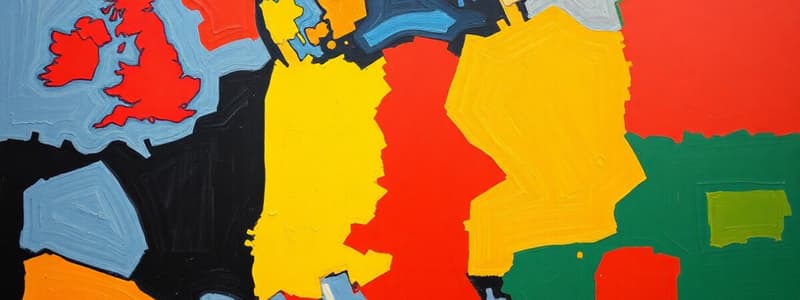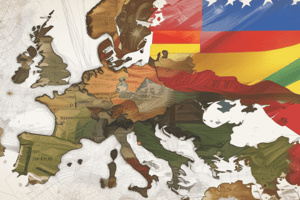Podcast
Questions and Answers
Welke periode wordt aangeduid als de prelude in de Belgische geschiedenis?
Welke periode wordt aangeduid als de prelude in de Belgische geschiedenis?
- 1700-1800
- 1815-1830 (correct)
- 1830-1850
- 1800-1815
Wat wordt bedoeld met de 'bufferstaat' in de context van het Belgisch buitenlands beleid?
Wat wordt bedoeld met de 'bufferstaat' in de context van het Belgisch buitenlands beleid?
- Een staat die alleen commerciële belangen nastreeft
- Een staat die tussen grote mogendheden ligt en zorgt voor stabiliteit (correct)
- Een staat die volledig onafhankelijk is van zijn buren
- Een staat die militaire macht wil uitbreiden
Wat was een belangrijk kenmerk van het Belgisch buitenlands beleid tussen 1815 en 1830?
Wat was een belangrijk kenmerk van het Belgisch buitenlands beleid tussen 1815 en 1830?
- Actieve deelname aan wereldwijde conflicten
- Neutraliteit en handhaven van onafhankelijkheid (correct)
- Zoeken naar koloniale expansie
- Aantal militaire allianties aangaan
Wat was een gevolg van de prelude periode voor België?
Wat was een gevolg van de prelude periode voor België?
In welke context wordt de term 'bufferstaat' voornamelijk gebruikt in de Belgische geschiedenis?
In welke context wordt de term 'bufferstaat' voornamelijk gebruikt in de Belgische geschiedenis?
Flashcards
De Prelude: De Bufferstaat
De Prelude: De Bufferstaat
De periode tussen 1815 en 1830, waarin België werd gecreëerd als een bufferstaat tussen Frankrijk en de Nederlandse provincies.
Bufferstaat
Bufferstaat
Een land dat tussen twee machtige landen ligt en dient als een barrière om conflicten te voorkomen.
1815-1830
1815-1830
De term die verwijst naar de periode tussen 1815 en 1830, voor de oprichting van België.
Nederlandse provincies
Nederlandse provincies
Signup and view all the flashcards
Verenigd Koninkrijk der Nederlanden
Verenigd Koninkrijk der Nederlanden
Signup and view all the flashcards
Study Notes
1815-1830: DE PRELUDE: DE BUFFERSTAAT
-
The period from 1815 to 1830 marked the early years of Belgian foreign policy, defined by the context of its establishment as a buffer state.
-
The Congress of Vienna (1815) created the United Kingdom of the Netherlands, a new state combining the southern and northern Netherlands. This union aimed to create a stronger defensive barrier against potential French expansionism.
-
Belgian territory, formerly part of the Austrian Netherlands, was incorporated into this new kingdom. This arrangement initially lacked distinct Belgian foreign policy.
-
The unification aimed to strengthen the region's defensive capabilities but created inherent tensions between the different regions and their cultural, linguistic, and economic interests.
-
Key actors and groups began to shape the evolving political landscape, highlighting underlying divisions.
-
The Dutch, primarily driven by commercial interests, wished to maintain the unity of the Kingdom, while the Southern Belgians, especially the Walloons and Flemish, often felt economically and culturally disadvantaged.
-
These disparities drove simmering discontent, ultimately leading to the Belgian Revolution.
-
The nascent identities of both halves of the new kingdom were beginning to assert themselves, with distinct interests and concerns which were reflected in early political discussions.
-
Economic differences played a significant role in the growing tensions. The Southern provinces (future Belgium) were increasingly industrializing whilst the Northern provinces (future Netherlands) remained focused more on their traditional and older systems.
-
The diverse nature of the population fueled the emerging Belgian identity, setting the stage for future foreign policy debates of the separate state.
Studying That Suits You
Use AI to generate personalized quizzes and flashcards to suit your learning preferences.




